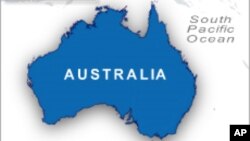Voting takes place Saturday for Australia’s first state-based First Nations Voice to Parliament. The body will advise the South Australian government and lawmakers on Indigenous issues.
The state of South Australia’s First Nations Voice to Parliament will be a representative, elected body for the state’s Aboriginal and Torres Strait Islander people and made up of members of those groups.
In October, Australians overwhelmingly rejected a national proposal to change the constitution to recognize First Nations people and create a body for them to advise the federal government.
In South Australia, officials have said it would give First Nations communities the chance to have their say at “the highest levels of decision-making ... including to Parliament on matters, policies and laws that affect them.”
The state Parliament passed laws last year to set up the advisory body. South Australian Premier Peter Malinauskas said then that it was a powerful show of respect toward Australia’s First Nations people.
Unlike the defeated nationwide proposal, the South Australian Voice to Parliament will not be incorporated into the state constitution and so it could be scrapped by future governments.
South Australia Attorney General Kyam Maher told local media the body will advise the state Parliament on policies affecting First Nations Australians.
“It won’t have the power to vote in Parliament,” Maher said. “It won’t have the power to veto anything. But what it will have the power to do is not just give advice to Parliament but speak within our Parliament.”
Unlike other local, state and federal elections, where voting is compulsory, the South Australian Voice to Parliament ballot is voluntary and open only to about 30,000 registered Aboriginal voters.
Travis Nash, an Aboriginal voter, told the Australian Broadcasting Corporation he was looking forward to having his views heard by lawmakers in the state capital, Adelaide.
“We are going to be having country people representing country people,” he said. “The people that will be appointed is my neighbor, in a way, instead of going to Adelaide [where] when I talk to people they are in suits and expensive shoes.”
Supporters said the plan would unite Australia and help address disadvantage. First Nations Australians have a lower life expectancy than non-Indigenous people and suffer high rates of poverty, incarceration and unemployment.
Opponents of the national Indigenous Voice to Parliament said the idea was divisive and would create special "classes" of Australian citizens, in which some were more equal than others. The debate in South Australia has been muted because the State Voice does not involve changing the state’s constitution and the vote is only open to registered First Nations people.
First Nations people make up just over 3% of Australia’s population and nearly 2.5% in South Australia, according to official data.
Voters will choose from 113 Aboriginal and Torres Strait Islander candidates for 46 positions.
Results are expected late this month, after the return of mail-in votes from remote areas.




